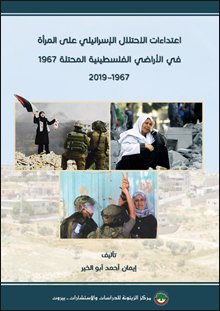Al-Zaytouna Centre for Studies and Consultations has published a new Arabic book entitled, “The Israeli Occupation Attacks on Women in the 1967 Occupied Palestinian Territories 1967–2019,” by Eman Abo Alkhair, and it is available for free download.
The 192-page book discusses the Israeli attacks on women in the 1967 occupied Palestinian territories, during the 1967–2019 period. This includes the direct attacks on them, such as killing, injuring, deportation, and arrest, and indirect assaults, such as targeting their families, or their surrounding environment, causing them more psychological, social and economic suffering.
| Click here to download:
>> The Israeli Occupation Attacks on Women in the 1967 Occupied Palestinian Territories 1967-2019 (Arabic) |
Since its occupation of Palestine, Israel has violated Palestinian human rights, having the ideology of killing and displacing the largest number of Palestinians, and the policy of occupation and replacement. As for the Palestinian woman, she was, and is still, at the core of the suffering endured by her people as a result of the occupation. The Israeli authorities have committed the most heinous crimes against the Palestinian women, including murder, displacement, arrest and torture in Israeli prisons, thus violating international human rights law.
The Israeli siege, closures and military checkpoints have increased the suffering of Palestinian women. On the educational level, Palestinian female students struggle either to bypass military checkpoints and reach their schools or universities, or from the closure of their schools or universities, or from storming these campuses causing psychological and physical harm.
In terms of health, Palestinian women lack the necessary health care. Many of them die, and others miscarry near military checkpoints, when the occupation delays them from getting to the hospital right on time. This is not to mention the harsh siege of Gaza Strip (GS), turning it into a large prison, and depriving Palestinian women of the right of movement. Thus severing social ties between the residents of the West Bank (WB) and GS, and preventing members of the same family from meeting.
The siege and closure policies, and the Israeli targeting of Palestinian homes has led to economic deterioration, which has increased the social and psychological burdens on Palestinian women. They are often forced to leave their home and find work, that could be humiliating in some cases, in order to provide a livelihood for their families, leaving psychological pressure and increasing marital problems.
Since its occupation of Palestine, the Israeli occupation has consistently violated the right to life of all Palestinian people, including women. The researcher has documented 122 women whom Israel killed in 1967. During the first six months of the 1987 Intifadah, and due to Israel’s arbitrary practices of severe beatings or the use of tear gas, 154 women had miscarriages, however, by the end of 1994, i.e., within 8 years, the number increased dramatically, reaching 7,400 miscarriages. Furthermore, the Israeli war on GS in 2008/2009, killed 217 women and wounded 830. As for the 2014 Israeli war on GS, it killed 510 women (22% of the deaths)-among them 23 were pregnant-and wounded 3,364 women (31.6% of the wounded).
This book was originally a Master’s thesis of an introduction and four chapters. The introduction displays women’s rights under international humanitarian law; chapter one deals with the direct Israeli attacks on the lives of Palestinian women; chapter two discusses the Israeli abuse of the dignity of Palestinian women and their torture in Israeli prisons; chapter three discusses the suffering of Palestinian women due to the Israeli military blockade and checkpoints; and chapter four deals with the impact of the Israeli violations against Palestinian families on women.







 ||
||

Leave A Comment